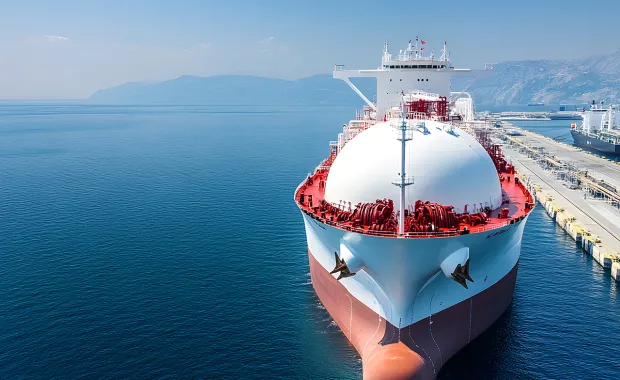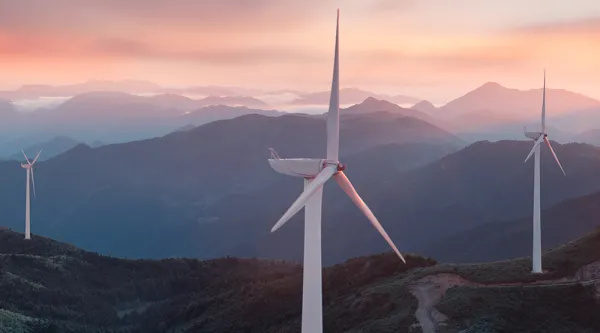- 1. Introduction to hydrogen's role in the energy transition
-
Derek Marinos
Welcome to Energy Transition Talks, a space to explore the latest trends and innovations shaping the future of energy and utilities. I'm Derek Marinos, your host for today's show. As global efforts to transition towards cleaner energy gain momentum, ports are emerging as critical nodes for hydrogen production, import, storage, and distribution.
Today we'll take a closer look at how ports are positioning themselves to meet ambitious hydrogen demand targets, enable decarbonization and open new economic avenues. We have two CGI experts on hand to help us dig a little deeper. Dr. Magali Amiel is a leading supply chain transport and logistics expert who leads CGI's practice in Canada. She brings more than 18 years of experience to the conversation.
And David van der Ploeg leads CGI development and delivery for CGI AgileDX-Sustainability and CGI AgileDX-Hydrogen applications. Prior to this role, David was responsible for the delivery of mission critical information systems in the Dutch national energy market. Welcome to you both.
Magali Amiel
Thank you, Derek.
David van der Ploeg
Thank you.
Derek Marinos
It's good to be with you. David, I want to begin with you first and let's start with a brief overview of where hydrogen stands today as a low carbon energy source. What makes it a promising option for the energy industry?
David van der Ploeg
Well, we've seen hydrogen as a promising low energy or low carbon energy source for quite a while. There's been a bit of a hype a couple of years ago, then in some regions it died down a bit again. Depending on where around the world you look, it's more active than in other places. So the promising aspect of it, if you ask me, is certain geographies really have a big potential in renewable energy producing low carbon energy while other regions of the world have a high demand. Transferring this energy from one end of the world to the other is where one of the main challenges is and hydrogen as a carrier of renewable or low carbon energy is really one of its biggest potentials, I think.
Derek Marinos
Hydrogen is often seen as a key player in decarbonizing hard to abate sectors like heavy industry and transportation. What progress has been made in deploying hydrogen solutions in these sectors and what challenges remain?
David van der Ploeg
Well, we've seen really interesting proof of concepts, smaller tryouts in both transportation and heavy industry. I think especially in transportation in long distance, heavy transport, there is massive opportunity for hydrogen to play a critical role. And in heavy industry as well.
Many investments are currently being made at scale to deploy hydrogen in hard to decarbonize industries. Whereas the bigger projects are now starting to arise, being implemented and actual impact is really being made as we speak.
- 2. Supply chain challenges in hydrogen production and distribution
-
Derek Marinos
David, thank you for the table setter on hydrogen there. And I'd love to explore now the critical role of port authorities in enabling the hydrogen economy, particularly around the logistics and infrastructure challenges they encounter. Magali, can you talk us through the supply chain challenges in hydrogen production, storage, and distribution, and what steps are being taken to build the necessary infrastructure?
Magali Amiel
Really good question, Derek. Of course, the development of hydrogen supply chain, particularly for the post-authorities and essential part of the transition to low carbon economy. And what is interesting, what we're seeing around the world, it's really green hydrogen, EC has a key solution to the carbonized sector that are difficult to electrify because we talk a lot about electrification of transport and ports.
But for the shipping industry and the EV industry, it's quite difficult. So hydrogen is a good solution that they are looking at. Well, in terms of production, storage and distribution, when they look at the hydrogen supply chain, for post-authority, it's like what they have done with crude oil and LNG. So in terms of production, you have also the cost of the production of hydrogen and where the production will be done, close to the port or not.
That's meaning some transportation issues. In terms of storage, because hydrogen has low energy density by volume, that require larger storage facilities. So when you talk about ports, sometimes you are on urban areas or close to, you have some neighbors. So how they adjust on the supply chain, the use of their territory to implement storage for the hydrogen and also all the questions about the safety, risk and safety about hydrogen, it's important. So that's also important on supply chain to be sure that the ports, you know, follow the strict regulation to ensure the safety of the workers and the neighbor of the port. And finally, around distribution, it's really, and that's to the point to David, it's really international. How do you bring international collaboration and also international infrastructure in terms of pipeline, hydrogen tanker to be sure that you can move the hydrogen along the supply chain. So when to the second part of your question about the necessary infrastructure, of course, we are CGI, we are going to talk about technology. Technology, knowing more about the technology to develop hydrogen to secure the hydrogen transportation is really important.
Also all the development on port, you cannot use a pipeline that's used for the crude of oil with hydrogen, so you have some investment on that part to do too. And also all the regulation, know how the regulation between you know different part of the country in the world are the same, to be sure that you can have an international exchange of the hydrogen.
That's quite some of the aspects that we're seeing on the supply chain right now. And one of the projects really interesting for Canada, it's in July 2024, Canada and Germany signed the Hydrogen Alliance to create a robust international hydrogen supply chain. So that's going to inspire other initiative to flow.
- 3. Infrastructure developments by port authorities
-
Derek Marinos
That's a very interesting point you just brought up. You spoke a lot about regulation and you spoke about this new deal between Canada and Germany. There's a socioeconomic reality that's going on in Europe right now and that's going to necessitate really taking a deeper dive, especially on infrastructure. if I'm wondering if you can walk me through some of the specific infrastructure developments and upgrades that are being planned or implemented by port authorities to support hydrogen supply chains.
Magali Amiel
Absolutely. And what is really interesting from the port perspective on hydrogen supply chain, you have two pillars. The first pillars and the port authorities say, well, we are close to industrial areas. How we can use what we have around us to produce some hydrogen. So it's really you use the territory of the port and you implement infrastructure of production of hydrogen on ports.
And the other part is really the international exchange. That's the export and import. So that's other infrastructure. So the first you have to build, you use space available because some industry like crude oil, gas, chemical, RLS, now RLS used were important for the port and you transform for hydrogen and you develop this activity. You create job and you create also economical development and you decide on the infrastructure, have to develop your pipeline, and all the infrastructure about the transshipment of the hydrogen to tankers and to wagons.
So that's really you have the production, you have the storage, you have the pipeline and distribution network, you have all around import and export terminals, and also the collaboration with your industrial user to be sure that you have the right type of hydrogen you want to share with your partners. And on project, interesting, several projects ongoing, most of them on the first pillar. So the pillar that they want to produce green hydrogen to reduce their environmental impact. For example, you have the Port of Rotterdam in the Netherlands. have Irish Vision Project. We still need to developing a comprehensive hydrogen network, including production, storage, and distribution facilities.
You also have the port of Hamburg in Germany doing the same thing. You have the port of Los Angeles in the US, where it's really focused on this part too. And other development, for example, you have an agreement between France, Spain and Portugal to develop green hydrogens for small ships and using their network of ports to support the user of hydrogen for small ships, not the big ships for the Tri-Atlantic, more for the coastal ships. So that's interesting. You also have the port of Marseille, you first, it was a few months ago, announced an investment on using green hydrogen in their facilities. So we are seeing a lot of emulation around the hydrogen and the supply chain hydrogen for the port. And interesting too, one point important - all the green corridors. What we're seeing right now is the green corridor. You have one from, for example, the Port of Antwerp and the Port of Montreal. It's one we signed a few years ago. We are seeing some green corridors between Asia and Europe. So that's where we seeing the industry going to creating this, you know, supply chain network for hydrogen.
- 4. Ports as hubs for hydrogen trading and distribution
-
Derek Marinos
Thank you, Magali, and sustainability is such a key player here. And Magali spoke eloquently to the infrastructure that's set up. And David, this really makes ports uniquely positioned here to support hydrogen trading and distribution. Can you elaborate a bit on that?
David van der Ploeg
Definitely. I love how Marely already mentioned not only the transport aspect for ports, but also storage, distribution and the various roles that ports can pick up in this ecosystem. We see from a sustainability perspective that many countries have their own distinct challenges. To take an example, Belgium having a relatively low amount of shoreline and therefore low capacity for offshore wind and renewable energy generation is really looking at importing renewable energy through green hydrogen. While other countries like Canada already mentioned, but we also see potential in the Middle East, in Australia for example, to have a lot of renewable energy production and moving that through a hydrogen carrier into Europe and countries like Belgium that have really the big demand of additional renewable energy. So from a transportation perspective, really interesting.
From a storage perspective, think ports are also well positioned to function as regional and international hubs for hydrogen supplies having the supply chains coming into the port, storing hydrogen until it's necessary to be used. Ports, of course, having a lot of experience in these storage applications as well from oil, for example. So I see a lot of potential for ports in this bigger ecosystem internationally.
Derek Marinos
There is, and it seems like we're on the precipice of something really unique and interesting in the planet's effort or the humanity's effort to decarbonize. Collaboration is going to be very key here, of course. And we have industry, government, very important stakeholders, international partners. How are they coming together to ensure smooth transportation of hydrogen?
David van der Ploeg
Well, there's many parties at play and we're trying to figure out how this all works. So we see many smaller local developments, companies in a certain region working together, some producing hydrogen, some consuming hydrogen, some transporting locally or connecting to a bigger grid if something like that exists.
We see bigger developments countrywide or in Europe initiatives are being set up for a higher capacity transport system for hydrogen, bigger pipeline systems being deployed, for example. And then internationally, course, Magali already talked about green corridors, intercontinental transport. And there again, we need to integrate many parties to work together, create that network of supply and demand and match that intercontinentally. So many parties at play and we see developments in every stage or every size as I just mentioned and I think in its own sorts, so the smaller local hubs working together or the countrywide or even on the European level, for example, the networks being set up, they're all being figured out, being implemented as we speak. Whereas at some point we also need to look at integrating those into each other. So how will such a local hub connect to a European system? How will the European system work intercontinentally and link in with Canada, the Middle East, to sort of link the different scales of hydrogen ecosystems currently being deployed.
Derek Marinos
I think this is key and a very important point that you're bringing up here, David and Magali, because the European Union has set ambitious targets for hydrogen adoption with ports projected to account for more than 40 % of annual hydrogen demand by 2050. I know that seems a long way away, but it really is around the corner when it comes to working within this context with infrastructure and agreements between nations and continents.
- 5. Global demand drivers and regional leaders in hydrogen adoption
-
Derek Marinos
David, what are the key drivers behind global demand for hydrogen and which regions are leading the way in hydrogen adoption?
David van der Ploeg
Well, globally, there's a couple of perspectives. There's the energy import-export perspective. There's the sustainability perspective. There's always a financial aspect to it, of course.
And I think in terms of key drivers in Europe, sustainability is really a hot topic currently. So there it's often about importing renewable or low carbon energy sources in a volume that we cannot produce in Europe itself or not in the countries where we want to consume it. Sometimes also regarding seasonal differences. maybe in summer with a lot of renewable energy production, can produce the volumes that we want, but in winter we have a massive need for extra renewable energy. In terms of regions leading the way for production. I think Canada is really doing well, having a high potential for low carbon hydrogen production and taking on that challenge. We see interesting developments also in regions with a lot of sunlight, sunshine. So the Middle East, Australia, we've seen interesting developments also in South America, for example. So on the production side, it's mainly following the renewable energy potential. In terms of off-takers, I really see Europe from a sustainability perspective that's leading the way, think, ramping up the consumption side of things.
- 6. Impact of market forces and geopolitical considerations on hydrogen growth
-
Derek Marinos
And Magali, how do fluctuating market forces such as the cost of renewable energy and geopolitical considerations, rather, impact hydrogen's growth and development?
Magali Amiel
I think that's the question, right, because we talk about, you know, hydrogen, it's really global. So we talk with different, you know, geographical region, geopolitical issues. So of course you can. And I like the point, David, it's how we bring together all the partners of the ecosystem of hydrogen and hydrogen supply chain to work together, sharing information, building the relationships to be sure that we have this increase of using the hydrogen and also to remove the hydrogen and export is really important by geography. Of course, that's the trust, the reliance on the quality of the hydrogen and quality of relationship between the stakeholders, the integration with industrial users.
For hydrogen, the parallel that we can do with crude and oil is important because it's really where are the producer and what the industrial needs and how you shape your supply chain to be sure you have this exchange. And we know that fluctuation of the market can have a really big impact. For example, ports were going to invest on infrastructure because they have the possibility, right, to produce high level of hydrogen, but they don't have the strong relationships with the industrial user. It's a risk. And, you know, with the world that we are living right now with all the geopolitical issues, it's also a risk for the hydrogen. it's a partnership, relationships and trust maybe we will have all the partner to go further.
Derek Marinos
Thank you very much. David Van der Ploeg, thank you very much. This concludes our conversation.
I'm Derek Marinos. Thanks for listening.










